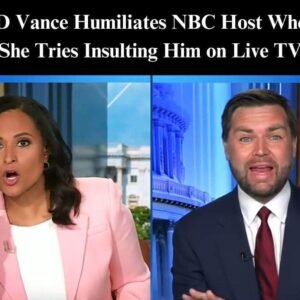Introduction
During a widely watched segment on NBC News, Republican vice-presidential nominee J.D. Vance had a tense exchange with host Kristen Welker. The discussion became heated as Welker pressed Vance on whether a future Trump administration would appoint a special prosecutor to investigate President Joe Biden. Vance pushed back, arguing that the line of questioning was designed to trap him into a politically charged response.
The Core Debate
A key issue in the interview was the possibility of a special prosecutor targeting political figures, particularly Biden. Welker repeatedly referenced Trump’s statements suggesting that the Department of Justice should investigate Biden and his associates. Vance defended the idea, stating that holding past leaders accountable is a fundamental principle of law and order.
Vance’s Position
Throughout the interview, Vance maintained that investigating prior wrongdoing is necessary to preserve public trust in the justice system. He argued that Trump’s call for accountability was not unusual and that past administrations have also pursued investigations against political figures. His stance reflected concerns about selective justice and partisan prosecution.
The Role of the Media
Vance criticized the media’s tendency to focus on “gotcha” questions rather than substantive policy discussions. He suggested that NBC’s questioning was meant to portray Trump’s stance as extreme while ignoring similar actions taken by Democrats. This tension highlighted broader concerns about media bias in political discourse.
Political Context
The debate over special prosecutors is not new. Historically, administrations have launched investigations into political opponents under public pressure or legal necessity. However, in today’s highly polarized environment, such actions are viewed through a partisan lens, with both sides accusing the other of using the justice system for political gain.
The Special Prosecutor Question
Welker directly asked Vance whether he would support a special prosecutor under Trump. She framed the question as a potential weaponization of the Department of Justice. Vance, however, reframed the issue, emphasizing that proper investigations into potential corruption should not be dismissed as partisan attacks.
Addressing Democratic Concerns
When pressed on whether such investigations could undermine democracy, Vance pushed back. He pointed out that the House Oversight Committee has already uncovered potentially corrupt business dealings involving Biden’s family. He argued that dismissing calls for investigation without reviewing the evidence is irresponsible.
Institutional Safeguards
Welker countered that the attorney general, not the president, appoints special prosecutors. Vance responded by highlighting the president’s influence over the attorney general. He pointed out that Biden appointed Merrick Garland, who oversees these decisions, making it misleading to suggest that Biden has no role in such matters.
Prosecutorial Precedents
The conversation shifted to the legitimacy of Trump’s legal troubles. Welker noted that grand juries, not political figures, indicted Trump. Vance responded by pointing out cases where DOJ officials moved to local offices to prosecute political opponents, arguing that such actions create a dangerous precedent.
Double Standards in Legal Action
Vance asserted that if a Trump administration official had left the DOJ to prosecute a Democratic leader, it would be widely condemned. He used this comparison to argue that investigations should be consistent across political lines rather than selectively applied based on party affiliation.
The Role of Oversight
At the heart of Vance’s argument was the belief that no politician should be above scrutiny. He emphasized that a well-functioning justice system must be willing to investigate credible allegations, regardless of political affiliation. His position resonated with conservatives who feel that Republicans are unfairly targeted by legal investigations.
The Media’s Influence
Throughout the exchange, Vance repeatedly criticized the media’s framing of the issue. He accused NBC of prioritizing sensationalist narratives over fair reporting. This critique echoed a broader Republican sentiment that mainstream media outlets disproportionately scrutinize conservative figures.
Broader Political Implications
The interview highlighted key issues that will shape upcoming elections, particularly debates over executive power and judicial independence. Vance’s defense of investigative oversight aligns with the Republican push for greater scrutiny of Democratic officials. Meanwhile, his media criticism reinforces conservative concerns about biased coverage.
Restoring Trust in Institutions
A recurring theme in Vance’s comments was the need for public confidence in government institutions. He argued that without fair investigations, the justice system risks losing legitimacy. His perspective suggests that addressing perceived double standards is essential for restoring faith in democratic processes.
Conclusion
The exchange between Vance and Welker underscored the challenges of political interviews in today’s media landscape. While Welker sought to frame Trump’s calls for investigations as politically motivated, Vance reframed them as necessary for justice. The debate reflects broader tensions over media bias, legal accountability, and the future of political oversight in America.
